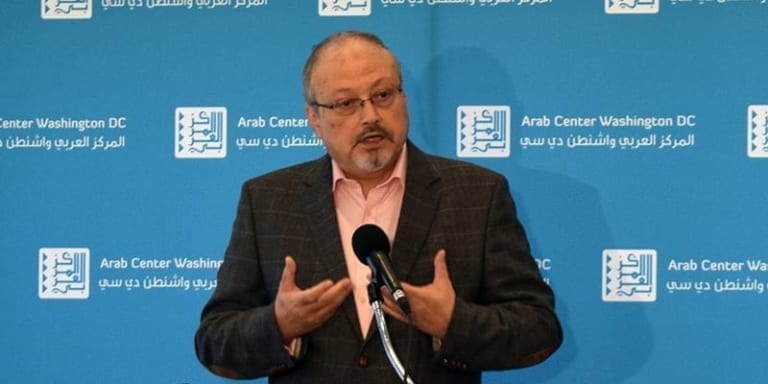
A Saudi Arabian secret criminal trial into the assassination of Washington Post columnist Jamal Khashoggi has ended. Five unnamed defendants were sentenced to death while three others were handed prison terms. The advisors close to Crown Prince Mohammed bin Salman, Saud al-Qahtani and Ahmed al-Assiri, were exonerated despite evidence provided by Turkish authorities exposing their culpability in the crime. Mohammed al-Otaibi, Saudi Consul General in Istanbul at the time of the murder, was also released without charge.
Whitewashing a Murder
This verdict can only be seen as whitewashing a serious crime against a Saudi citizen who sought justice, dignity, and rights for his people as he expressed in a presentation at Arab Center Washington DC on November 17, 2017. It also speaks of a wanton disregard for the principles of morality and accountability without which no country or political system can hope to live, progress, and prosper.
In fact, the judgment failed to allow Saudi Arabia to lift the cloud surrounding its international reputation following Khashoggi’s murder in October 2018. That it avoided identifying the real culprits in the assassination is testament to how far the kingdom has to go to establish even a basic practice of the rule of law, which is fundamental to a civilized and modern state.
Following tribal custom, there should be no surprise if those sentenced to death are freed following the payment of blood money (diyya) with the blessing of the royal palace and religious authorities. Those jailed will then likely be pardoned. Khashoggi’s family is expected to accept whatever is offered to complete the coverup—not because they choose this path but because refusing to do so will bring government and public opprobrium and backlash.
A Falsehood and a Warning
With this verdict, Saudi Arabia is trying to convince its citizens and the world that it has dealt fairly with the Khashoggi murder. In reality, the verdict presents a disturbing and ominous falsehood and a dangerous warning. Riyadh’s assertion that justice has been served is a falsehood. In Khashoggi’s case justice has not been impartial and was skewed in favor of those who are in power or can wield it. Operatives on missions for the crown prince of Saudi Arabia can expect no repercussions; they now have unlimited license to jail, torture, and kill, no matter the consequence.
Concomitantly, advisors at the royal palace may feel emboldened to carry out other killings and assassinations in the name of the future Saudi king, the Custodian of the Two Holy Mosques. This will unmistakably lead to more domestic and international criticism of Saudi Arabia and will further jeopardize its stature and relations with law-abiding states around the world.
The warning is that immunity from the long arm of the repressive state will not be accorded to Saudi citizens, inside or outside the country, if they dare to voice their opinion. Those who criticize how government is run or who merely attempt to counsel gradual change, as Khashoggi had done, take great risk and have no protection. In other words, the power of the royal palace is immutable and inviolable, even if it leads the country to oppression and destruction.
In his writings and public engagements, Khashoggi was careful to remind his audience that he had the best of intentions for a changed and respected Saudi Arabia and was not interested in opposing the crown prince or his policies. He counseled gradualism and caution for the necessary political, economic, and social reforms championed by Mohammed bin Salman.
The Verdict Is Not the End of the Matter
The Saudi government may think that this verdict will close the file on the Khashoggi murder and therefore restore its credibility. In reality, however, it will increase the international community’s scrutiny of Saudi policies and practices. There currently are human rights and women’s rights activists in Saudi prisons, and the verdict will most assuredly cause increased alarm about their fate.
Rights activists and organizations should be justified to ask: if an assassination can be this easily and shamelessly covered up, what assurances are there that jailed Saudis will receive fair trials and expect just verdicts in the future?
Finally, while Saudi Arabia might count on the Trump Administration and other friendly governments, in the region and beyond, to help it avoid the repercussions from the Khashoggi murder, it would do well to understand that impunity cannot be a blanket or permanent cover. Its reputation remains on the line no matter the whitewashing or the convoluted twists Khashoggi’s killing was put through. For now, at least, in Jamal’s case “justice delayed is justice denied.”

